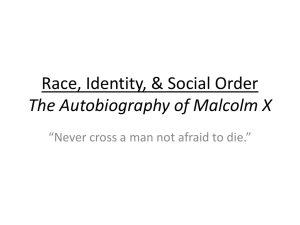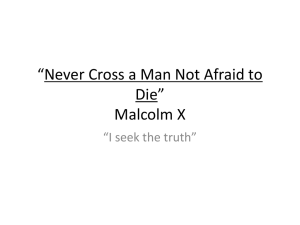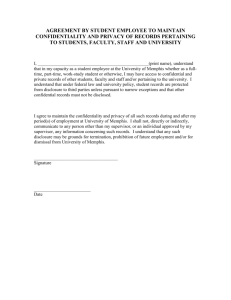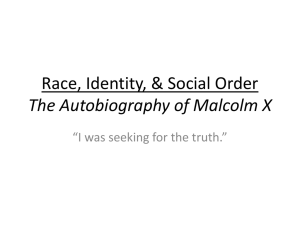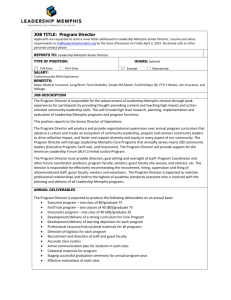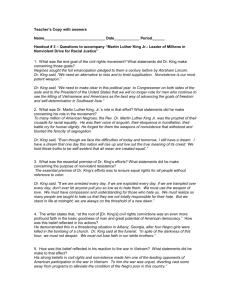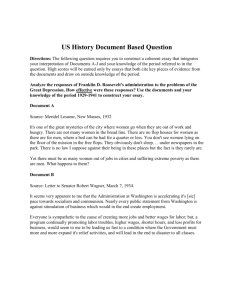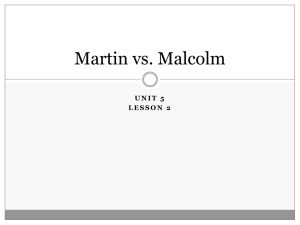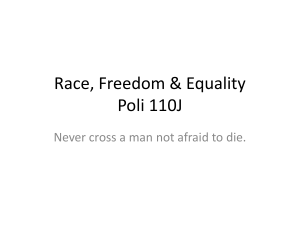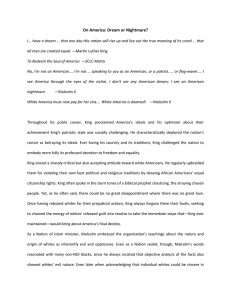Civil Rights Movement DBQ
advertisement
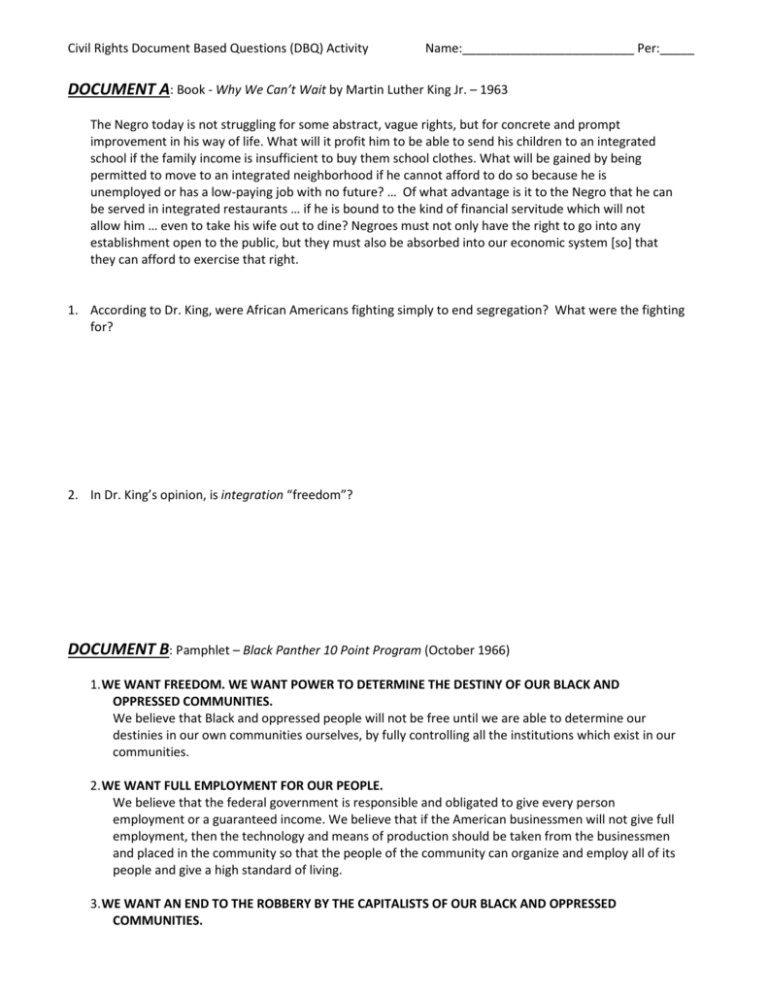
Civil Rights Document Based Questions (DBQ) Activity Name:_________________________ Per:_____ DOCUMENT A: Book - Why We Can’t Wait by Martin Luther King Jr. – 1963 The Negro today is not struggling for some abstract, vague rights, but for concrete and prompt improvement in his way of life. What will it profit him to be able to send his children to an integrated school if the family income is insufficient to buy them school clothes. What will be gained by being permitted to move to an integrated neighborhood if he cannot afford to do so because he is unemployed or has a low-paying job with no future? … Of what advantage is it to the Negro that he can be served in integrated restaurants … if he is bound to the kind of financial servitude which will not allow him … even to take his wife out to dine? Negroes must not only have the right to go into any establishment open to the public, but they must also be absorbed into our economic system [so] that they can afford to exercise that right. 1. According to Dr. King, were African Americans fighting simply to end segregation? What were the fighting for? 2. In Dr. King’s opinion, is integration “freedom”? DOCUMENT B: Pamphlet – Black Panther 10 Point Program (October 1966) 1. WE WANT FREEDOM. WE WANT POWER TO DETERMINE THE DESTINY OF OUR BLACK AND OPPRESSED COMMUNITIES. We believe that Black and oppressed people will not be free until we are able to determine our destinies in our own communities ourselves, by fully controlling all the institutions which exist in our communities. 2. WE WANT FULL EMPLOYMENT FOR OUR PEOPLE. We believe that the federal government is responsible and obligated to give every person employment or a guaranteed income. We believe that if the American businessmen will not give full employment, then the technology and means of production should be taken from the businessmen and placed in the community so that the people of the community can organize and employ all of its people and give a high standard of living. 3. WE WANT AN END TO THE ROBBERY BY THE CAPITALISTS OF OUR BLACK AND OPPRESSED COMMUNITIES. We believe that this racist government has robbed us and now we are demanding the overdue debt of forty acres and two mules. Forty acres and two mules were promised 100 years ago as restitution for slave labor and mass murder of Black people. We will accept the payment in currency which will be distributed to our many communities. The American racist has taken part in the slaughter of our fifty million Black people. Therefore, we feel this is a modest demand that we make. 3. Using language from the above document, explain how the Black Panther Party was more of a socialist organization than a Civil Rights organization. DOCUMENT C: Book – Daisy Bates – The Long Shadow of Little Rock (1962) – Elizabeth Ann Eckford The crowd was quiet. I guess they were waiting to see what was going to happen. When I was able to steady my knees, I walked up to the guard who had let the white students in. He too didn't move. When I tried to squeeze past him, he raised his bayonet and then the other guards moved in and they raised their bayonets. They glared at me with a mean look and I was very frightened and didn't know what to do. I turned around and the crowd came toward me. They moved closer and closer. Somebody started yelling, 'Lynch her! Lynch her!' I tried to see a friendly face somewhere in the mob - someone who maybe would help. I looked into the face of an old woman and it seemed a kind face, but when I looked at her again, she spat on me. They came closer, shouting, 'No nigger bitch is going to get in our school. Get out of here!' I turned back to the guards but their faces told me I wouldn't get any help from them. Then I looked down the block and saw a bench at the bus stop. I thought, If I can only get there I will be safe.' I don't know why the bench seemed a safe place to me, but I started walking toward it. I tried to close my mind to what they were shouting, and kept saying to myself, If I can only make it to the bench I will be safe. When I finally got there, I don't think I could have gone another step. I sat down and the mob crowded up and began shouting all over again. Someone hollered, 'Drag her over to this tree! Let's take care of that nigger.' Just then a white man sat down beside me, put his arm around me and patted my shoulder. He raised my chin and said, 'Don't let them see you cry.' 4. Were the police officers (guards) there to help Ms. Eckford? How did she determine this? 5. How is this a good source for us to better understand the integration of Central High School in Little Rock, Arkansas? DOCUMENT D: Book – Coming of Age in Mississippi (1968) – Ann Moody At noon, students from a nearby white high school started pouring in to Woolworth's. When they first saw us they were sort of surprised. They didn't know how to react. A few started to heckle and the newsmen became interested again. Then the white students started chanting all kinds of anti-Negro slogans. We were called a little bit of everything. The rest of the seats except the three we were occupying had been roped off to prevent others from sitting down. A couple of the boys took one end of the rope and made it into a hangman's noose. Several attempts were made to put it around our necks. The crowds grew as more students and adults came in for lunch. We kept our eyes straight forward and did not look at the crowd except for occasional glances to see what was going on. All of a sudden I saw a face I remembered—the drunkard from the bus station sit-in. My eyes lingered on him just long enough for us to recognize each other. Today he was drunk too, so I don't think he remembered where he had seen me before. He took out a knife, opened it, put it in his pocket, and then began to pace the floor. At this point, I told Memphis and Pearlena what was going on. Memphis suggested that we pray. We bowed our heads, and all hell broke loose. A man rushed forward, threw Memphis from his seat, and slapped my face. Then another man who worked in the store threw me against an adjoining counter. Down on my knees on the floor, I saw Memphis lying near the lunch counter with blood running out of the corners of his mouth. As he tried to protect his face, the man who'd thrown him down kept kicking him against the head. If he had worn hard-soled shoes instead of sneakers, the first kick probably would have killed Memphis. Finally a man dressed in plain clothes identified himself as a police officer and arrested Memphis and his attacker. 6. When did “all hell break loose”? Why do you think the whites became so upset at this point? 7. What happened to Memphis after he was beaten up? DOCUMENT E: Speech – The Revolution is at Hand – given by John Lewis at the March on Washington – August 28th, 1963 The revolution is at hand, and we must free ourselves of the chains of political and economic slavery. The nonviolent revolution is saying, "We will not wait for the courts to act, for we have been waiting hundreds of years. We will not wait for the President, nor the Justice Department, nor Congress, but we will take matters into our own hands, and create a great source of power, outside of any national structure that could and would assure us victory." For those who have said, "Be patient and wait!" we must say, "Patience is a dirty and nasty word." We cannot be patient, we do not want to be free gradually, we want our freedom, and we want it now. We cannot depend on any political party, for the Democrats and the Republicans have betrayed the basic principles of the Declaration of Independence. We all recognize the fact that if any radical social, political and economic changes are to take place in our society, the people, the masses must bring them about. In the struggle we must seek more than mere civil rights; we must work for the community of love, peace and true brotherhood. Our minds, souls, and hearts cannot rest until freedom and justice exist for all the people. 8. Why is “Patience” a “dirty and nasty word” to African Americans? 9. Who does Lewis believe is responsible for the eventual “victory” of freedom? DOCUMENT F: Paper – The Basis of Black Power: SNCC Position Paper – Published in The New York Times August 5th, 1966 The myth that the Negro is somehow incapable of liberating himself, is lazy, etc., came out of the American experience. In the books that children read, whites are always "good" (good symbols are white), blacks are "evil" or seen as savages in movies, their language is referred to as a "dialect," and black people in this country are supposedly descended from savages. Any white person who comes into the movement has the concepts in his mind about black people, if only subconsciously. He cannot escape them because the whole society has geared his subconscious in that direction. 10. According to this primary source document, why should whites not be allowed to participate in the movement? 11. What myths have we learned about the “Negro” and where have we learned them? DOCUMENT G: TV Interview with Malcolm X on The Les Crane Show (1964) Crane: You’ve been a critic of some of the Negro leadership in this country-- Martin Luther King, Roy Wilkins, Abernathy, and others--have you changed in your feelings toward them of late? Malcolm X: I think all of us should be critics of each other. Whenever you can’t stand criticism you can never grow. I don’t think that it serves any purpose for the leader of our people to waste their time fighting each other needlessly. I think that we accomplish more when we sit down in private and iron out whatever differences that may exist and try and then do something constructive for the benefit of our people. But on the other hand, I don’t think that we should be above criticism. I don’t think that anyone should be above criticism. Crane: Violence or the threat of violence has always surrounded you. Speeches that you’ve made have been interpreted as being threats. You have made statements reported in the press about how the Negroes should go out and arm themselves, form militias of their own. I read a thing once, a statement I believe you made that every Negro should belong to the National Rifle Association. Malcolm X: No, I said this: That in areas of this country where the government has proven its--either its inability or its unwillingness to protect the lives and property of our people, then it’s only fair to expect us to do whatever is necessary to protect ourselves. And in situations like Mississippi, places like Mississippi where the government actually has proven its inability to protect us and it has been proven that often times the police officers and sheriffs themselves are involved in the murder that takes place against our people then I feel, and I say that anywhere, that our people should start doing what is necessary to protect ourselves. This doesn’t mean that we should buy rifles and go out and initiate attacks indiscriminately against whites. But it does mean that we should get whatever is necessary to protect ourselves in a country or in an area where the governmental ability to protect us has broken down. Crane: Therefore you do not agree with Dr. King’s Gandhian philosophy Malcolm X: My belief in brotherhood would never restrain me in any way from protecting myself in a society from a people whose disrespect for brotherhood makes them feel inclined to put my neck on a tree at the end of a rope. [Applause] Crane: Well, it sounds as though you could be preaching a sort of anarchy. Malcolm X: No, no. I respect government and respect law. But does the government and the law respect us? If the FBI, which is what people depend upon a national scale to protect the morale and the property and the lives of the people, can’t do so when the property and lives of Negroes and whites who try and help Negroes are concerned, then I think that it’s only fair to expect elements to do whatever is necessary to protect themselves. And this is no departure from normal procedure. Because right here in New York City you have vigilante committees that have been set up by groups who see where their neighborhood community is endangered and the law can’t do anything about it. So-and even their lives aren’t at stake. So--but the fear, Les, seems to come into existence only when someone says Negroes should form vigilante committees to protect their lives and their property. I’m not advocating the breaking of any laws. But I say that our people will never be respected as human beings until we react as other normal, intelligent human beings do. And this country came into existence by people who were tired of tyranny and oppression and exploitation and the brutality that was being inflicted upon them by powers higher than they, and I think that it is only fair to expect us, sooner or later, to do likewise. 12. Was Malcolm X in favor of anarchy? 13. Explain Malcolm X’s rational (reasoning) for using violence if necessary. In your answer include quotes from the above interview. DOCUMENT H is on the next page (An Open Letter to Dr. King from Birmingham Clergymen and Dr. King’s response) 14. Summarize the main argument of the clergymen. Then do the same for Dr. King’s rebuttal. Clergymen Dr. King
